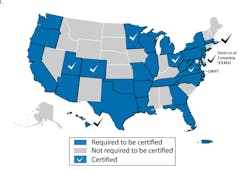Federal Transit Funding at Risk for States Not Meeting Rail Transit Program Safety Deadline
This article was updated 4/16/18, 12:13 CST
The Federal Transit Administration wants transit agencies to know they have one year left to receive certification for its State Safety Oversight Program (SSO), and FTA Acting Administrator Jane Williams stressed, “That deadline is not waivable.
“It is in statute. Unless Congress acts to extend that deadline, I have no ability as the acting administrator to change that.”
The program is a federal statutory requirement as part of MAP-21, that requires states with rail transit systems to establish an FTA-certified SSO Program by April 15, 2019. The FTA SSO Program final rule took effect in April 2016, establishing a three-year period for states to obtain program certification.
Williams said, “If this is not completed they risk the loss of all of their transit funds.
“It doesn’t matter if it’s urban or rural, it doesn’t matter if it’s formula or not ..."
There are 30 states with rail transit systems required to meet the FTA approval. As of one-year out from the deadline, eight states have completed the process and six more are in line to be certified.
An initial hang-up for the process was a requirement by seven of the states to have legislative approval on the federal measure and state agency safety protocols. As of today, one year out from the deadline, the only state left to require legislation or an executive action through the governor is the state of Tennessee.
Williams said legislation has been introduced and the FTA has been working with the state closely to make sure this gets passed this term. “If it doesn’t, the likelihood the state of Tennessee actually receiving funds and being certified by the deadline next year is almost zero,” she said. “You need to recognize passing legislation is your first step in certification.
“You pass the legislation and then there’s the process between the state and FTA in creating program standards; it takes a few months to bring that online.”
Following the media call with the FTA, Tennessee Public Transportation Association President and Chattanooga Area Regional Transportation Authority Executive Director Lisa Maragnano said legislation passed earlier this month and was sent to the governor's office. The governor has 10 days to sign it and she said they didn't see anticipate any issues.
For agencies not operating rail but in a state not yet meeting certification, “It’s unfortunate they’re caught up in it as well,” Williams said. “That’s how the law works.”
Those agencies should work with their state folks to help in getting this over the line, she said.
To assist those working toward certification, the FTA has provided a toolkit and guidance to help in managing those efforts. Since 2013, the FTA has also provided about $112.4 million in grant funding to eligible states to be able to create these programs.
The FTA has also reached out to political leadership in the states to let their governors know, along with their U.S. Senators, so they are all aware of the deadline and can help to ensure this deadline is met.
The FTA is encouraging states to act quickly because processing the applications will take time.
“We have a very dedicated team working on the certification process,” Williams said. “What we’re worried about is the arc of the applications all coming at once. As you can imagine, it’s a lot of material to review to make sure the program standard has the necessary enforcement, financial capabilities that they need to actually stand up the organization … if we do get 20 in February, we will have a resource issue at that time.”
The FTA has posted a status table online that shows each state’s progress toward certification. The table also shows the approximate amount of federal transit funds the FTA would be prohibited from obligating should the state fail to achieve certification by the deadline.
Williams said for any state not meeting the deadline, the funding wouldn’t go away, but it would be withheld until the certification is met.
“We don’t want anyone to be in that position,” she stressed. So we’re working very hard to make sure they’re all over the finish line prior to that.”
